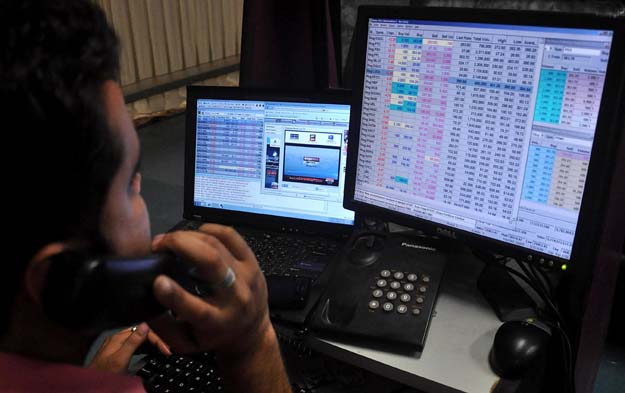
Overall, the Karachi Stock Exchange (KSE) has seen a bearish trend and has seen a fall of 14% in the benchmark since the start of February.
On Friday, the market closed near to flat at the end of the morning session. However, later in the day, the wider market witnessed a free fall as institutions struggled to offload.
It was a second consecutive day with benchmark index swinging 1,000 points as local institutions remained sellers likely triggered by stop losses.

At close on Friday, the Karachi Stock Exchange (KSE)-100 Index closed at 29,957.83 points, registering a decline of 2.35% or 721.14.
“Morning news of Moody’s downgrading Credit rating for top five Pakistani Banks put financials under pressure in early trade with National Bank (NBP PA) hitting the lower price limit,” said Sibtain Mustafa, analyst at Elixir Securities.
“Lack of confidence in the broader market failed to absorb pressure, pulling first-tier stock to their respective recent lows.
“The domino effect of leverage unwinding and panic selling where banking stock ex-MCB traded at 0.8x PBV, which was last seen in 2013, has put a question mark on the overall bullish stance of value investors where economy, low interest rates and inflation calls for outright buys.
“Another source of concern is a rift between brokers and the regulator over the treatment of brokerage houses’ capital adequacy, which still stands inconclusive despite several meetings.

“Our view is an outright buy call with banks, select exploration and production and textiles which cumulatively are trading below 7.5x PE,” he suggested.
“We believe sanity will prevail and liquidity will find its way in the coming month, however, one cannot rule out further jitters,” said Mustafa.
Trade volumes fell to 213 million shares compared to 258 million on Thursday.
Shares of 341 companies were traded on the last trading session of the week. Of these, 256 companies declined, 69 closed higher and 16 remained unchanged. The value of shares traded during the day was Rs10.2 billion.
The Bank of Punjab was the volume leader with 30.9 million shares, losing Rs1 to close at Rs7.81. It was followed by Pak Elektron with 25.3 million shares, losing Rs1.49 to close at Rs44.55 and Jahangir Siddiqui and Company with 10.7 million shares, losing Rs0.47 to close at Rs15.09.
Foreign institutional investors were net sellers of Rs746.6 million worth of shares during the session, according to data maintained by the National Clearing Company of Pakistan.
Published in The Express Tribune, March 28th, 2015.
Like Business on Facebook, follow @TribuneBiz on Twitter to stay informed and join in the conversation.











































COMMENTS (4)
Comments are moderated and generally will be posted if they are on-topic and not abusive.
For more information, please see our Comments FAQ